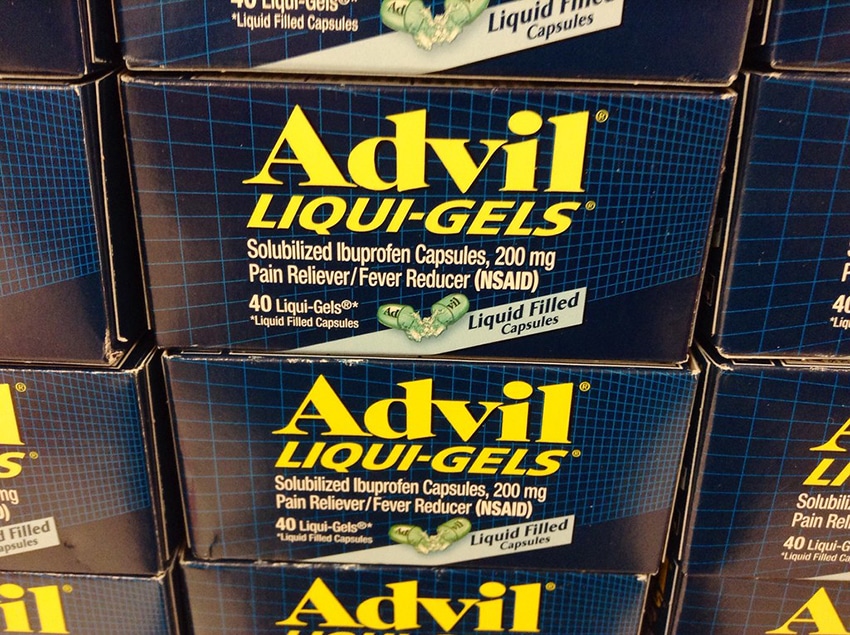Key Takeaways
- Advil (Ibuprofen) is one of the most common human medications causing toxicity in dogs
- Call your veterinarian as soon as possible if your dog has eaten some Advil (ibuprofen)
- Just one small dose can cause toxic signs such as gastrointestinal disturbance
Advil, a commonly used over-the-counter human medication, contains the active ingredient ibuprofen. Ibuprofen is a non-steroidal anti-inflammatory drug (NSAID) most commonly used to treat minor aches, pains, swelling, and fever in humans.
While it may be tempting to try to relieve your pooch’s swollen paw or other aches, you should NEVER administer Advil to your furbaby. Just a single 200mg tablet can cause signs of toxicity in small dogs.
As a vet, treating Advil poisoning can be frustrating as, sadly, most dogs that I see have ingested Advil 4-8 hours prior to presentation at my clinic. The sooner I can treat your dog after eating ibuprofen, the better the prognosis is for them. If you suspect your dog has ingested Advil, call your veterinarian or the dog Poison Helpline IMMEDIATELY.
How much Advil is toxic to dogs?
The active ingredient in Advil, ibuprofen, has a very narrow margin of safety in our canine companions.
In fact, just a single 200mg capsule can cause tummy upsets in larger dogs and even more severe signs of toxicity in smaller pooches.
A single dose as low as 50mg/kg (22mg/lb) can cause toxicity. Chronic or repeated administration of ibuprofen needs even less, just 5mg/kg (2mg/lb), to cause signs of toxicity.
If your pooch is on any medication, then they may be even more sensitive to the toxic effects of ibuprofen.
What to do if my dog ate Advil?
If you suspect your dog has eaten Advil, then contact your veterinarian immediately to determine the best course of action. Invariably, your DVM will recommend that vomiting be induced and that your dog be given activated charcoal to prevent absorption of the ibuprofen.
.
Your dog must receive prompt veterinary attention. If you cannot contact your veterinarian, call the dog Poison Helpline at (855)764-7661 and follow their instructions.
When to see a vet?
In short, your dog needs to be seen as soon as possible by your veterinarian.
The degree of damage and severity of the poisoning will depend on the amount of Advil that your dog ingested, but the sooner your DVM can instigate treatment, the better the outcome for your dog.
What if my dog ate plenty of Advil but seems fine?
Most dogs that eat Advil seem perfectly fine for a period of time afterward while it’s being absorbed into their bloodstream.
Due to its mechanism of action, ibuprofen damages the lining of the gastrointestinal tract causing vomiting and diarrhea. This is generally what prompts clients to contact my clinic, but often the damage has already occurred.
Once ibuprofen has been absorbed, it’s metabolized in the liver and can cause damage to both the liver and kidneys.
If your dog has eaten ANY Advil, contact your veterinarian or the dog Poison Helpline IMMEDIATELY, even if they seem completely fine.
Signs that my dog has Advil poisoning
Clinical signs that your dog has eaten some Advil include:
- Vomiting (with or without blood)
- Diarrhea
- Black, tarry feces (indicates blood)
- Depressed and lethargic
- Pale gums
- Poor apdogite
Signs of more severe Advil poisoning are:
- Incoordination
- Seizures
- Yellowing of skin and mucous membranes (jaundice)
- Increased drinking
- Increased or reduced urination
- Coma
What happens to dogs that eat Advil?
Advil relieves signs of pain in humans, but unfortunately, it causes significant irritation to the gastrointestinal tract of our canine companions.
This leads to vomiting, diarrhea, and even bleeding throughout your pooch’s delicate intestinal lining. Metabolized in the liver and excreted through the kidneys, ibuprofen can damage these organs and lead to lasting functional compromise or even complete failure. If your dog eats Advil, you should contact your veterinarian immediately, even if they seem ok.
Why is Advil toxic to dogs?
The active ingredient in Advil, ibuprofen, acts in a similar way to other NSAIDs in that it blocks processes within the body that cause inflammation, specifically the enzyme COX (cyclo-oxygenase).
Unfortunately, ibuprofen is non-selective, and some COX enzymes are actually crucial for the maintenance of normal bodily functions such as gastrointestinal, kidney, and liver functions. The action of ibuprofen on this helpful enzyme causes the clinical signs of Advil poisoning.
How do vets treat Advil poisoning?
Advil poisoning is severe and correlates to the amount of drug eaten.
Firstly, your veterinarian will deduce approximately how much your dog has consumed in relation to its body mass (mg per kg). This will help to determine the course of action and prognosis for your dog.
If Advil was consumed within a couple of hours, then your DVM will recommend inducing vomiting, and this is safely performed by giving your dog an injection.
The next step will be to provide supportive therapy in the form of fluids through an intravenous catheter and activated charcoal, which binds to the Advil to prevent it from being absorbed through your dog’s intestines.
There’s no specific treatment for ibuprofen toxicity, but your veterinarian will likely administer gastro-protectant medications and antacids to reduce damage to the lining of your dog’s intestinal tract.
Severe cases may require seizure medication and muscle relaxants.
How long is the recovery?
An important part of recovery is monitoring your dog’s liver and kidney function through blood work.
dogs with kidney damage may require prolonged fluid therapy and be prescribed renal failure medication ongoing. Liver supplements may be required if your dog has liver damage to protect the remaining function. This may be needed for life if significant damage has occurred.
Final Woof
Ibuprofen is the active ingredient in Advil, an over-the-counter human medication used to treat inflammation such as swelling and headaches.
While it’s a great medication to alleviate pain for us humans, it’s dangerous for our fur babies.
Ibuprofen causes gastrointestinal disturbances in dogs and can also cause kidney and liver damage.
In severe poisoning cases, dogs may suffer seizures and even death. There’s no specific treatment for Advil poisoning, and your dog will need supportive therapy in the form of fluids and protectant medications for their stomach, intestines, and liver.
If you suspect or know your pooch has eaten some, then you should contact your veterinarian or the dog Poison Helpline immediately and follow their instructions.


